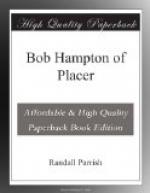Riding alone, and slightly in advance of the main body, his mount a rangy, broad-chested roan, streaked with alkali dust, the drooping head telling plainly of wearied muscles, was the officer in command. He was a pleasant-faced, stalwart young fellow, with the trim figure of a trained athlete, possessing a square chin smoothly shaven, his intelligent blue eyes half concealed beneath his hat brim, which had been drawn low to shade them from the glare, one hand pressing upon his saddle holster as he leaned over to rest. No insignia of rank served to distinguish him from those equally dusty fellows plodding gloomily behind, but a broad stripe of yellow running down the seams of his trousers, together with his high boots, bespoke the cavalry service, while the front of his battered campaign hat bore the decorations of two crossed sabres, with a gilded “7” prominent between. His attire was completed by a coarse blue shirt, unbuttoned at the throat, about which had been loosely knotted a darker colored silk handkerchief, and across the back of the saddle was fastened a uniform jacket, the single shoulder-strap revealed presenting the plain yellow of a second lieutenant.
Attaining to the summit of a slight knoll, whence a somewhat wider vista lay outspread, he partially turned his face toward the men straggling along in the rear, while his hand swept across the dreary scene.
“If that line of trees over yonder indicates the course of the Bear Water, Carson,” he questioned quietly, “where are we expected to hit the trail leading down to the ford?”
The sergeant, thus addressed, a little stocky fellow wearing a closely clipped gray moustache, spurred his exhausted horse into a brief trot, and drew up short by the officer’s side, his heavy eyes scanning the vague distance, even while his right hand was uplifted in perfunctory salute.
“There ’s no trail I know about along this bank, sir,” he replied respectfully, “but the big cottonwood with the dead branch forking out at the top is the ford guide.”
They rode down in moody silence into the next depression, and began wearily climbing the long hill opposite, apparently the last before coming directly down the banks of the stream. As his barely moving horse topped the uneven summit, the lieutenant suddenly drew in his rein, and uttering an exclamation of surprise, bent forward, staring intently down in his immediate front. For a single instant he appeared to doubt the evidence of his own eyes; then he swung hastily from out the saddle, all weariness forgotten.
“My God!” he cried, sharply, his eyes suspiciously sweeping the bare slope. “There are two bodies lying here—white people!”




